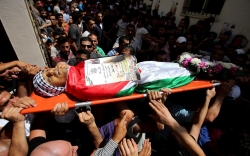Three weeks after a firebomb attack purportedly carried out by Israeli settlers against a Palestinian family in the West Bank village of Duma killed a toddler and his father, and left his mother and brother severely injured, mourning family members are having to cope with the high cost of medical care and navigating the fraught process of pursuing compensation for their loss.
Following the July 31 attack on the Dawabsheh household, cousin Mohammed Dawabsheh has been acting as the family’s caretaker in Israel, traveling daily between Duma and Sheba Medical Center in Tel Hashomer, where he tends to Reham, 27, and four-year-old Ahmed. Both remain in critical condition with burns across most of their bodies.
The trip, which costs around $80 each way and requires clever maneuvering of Israel’s complicated military checkpoints and permit system, has proven a heavy burden for a family from an impoverished village. Complicating the matter, Mohammed, who does not speak Hebrew, has been made to represent the family to a myriad of Israeli officials, delegations and journalists.
Israeli Prime Minister Benjamin Netanyahu, who visited the Dawabsheh family in Tel Hashomer hours after the attack, took advantage of a photo op with Ahmed to condemn “terrorism wherever it comes from, whatever side of the fence.” Away from the cameras, he also promised the family that he would cover their medical expenses and pay to rebuild their home.
Unlike Israeli settlers in the West Bank, however, the Dawabsheh family is not eligible for compensation under Israel’s law for victims of terrorism, since they are not citizens or residents of the state. And while they may petition a Defense Ministry compensation committee to consider their case, they have no legal recourse to contest its decision.
It’s unclear whether Netanyahu’s promise means he will help expedite the committee process or circumvent it. But by immediately offering to cover the costs, he has exposed an inequality under Israeli law, whereby Israelis and Palestinians who fall victim to attacks in the same territory are not eligible for the same compensation. He also inadvertently admitted the state’s guilt by assuming responsibility for the culprits’ actions. Though Netanyahu was careful to distance himself from the attackers, who he characterized as “extremists.”
“The commitment is solid,” Netanyahu’s spokesman Mark Regev told Al Jazeera. But no one from the prime minister’s office, Defense Ministry or any government representative has been in contact with the Dawabsheh family thus far or has offered any financial assistance.
Yousef Jabareen, an Arab member of Israel’s parliament, has appealed to the attorney general, demanding that the state apply the same compensation rights to Palestinian victims of Jewish attacks as it does to Jewish victims of Palestinian attacks. "Casualties on the basis of nationalistic actions should be entitled to compensation from the state, no matter whether they are Jews or Arabs," he wrote in a letter earlier this month.
The Palestinian Authority has also yet to offer any compensation. A senior Palestinian official told Al Jazeera that the attack in Duma would be added to the “list of crimes against the Palestinian people for which it seeks Israel’s conviction in international courts.”
Whether or not Israel allows the Dawabsheh family to bypass bureaucratic hurdles toward compensation, it is by no means clear that the family will accept the money, as there are conflicting views on the matter. They know that Israeli medical care is superior to what they would receive in the West Bank, and that they cannot afford even a fraction of their accumulating costs. They are also eager for Israel to assume the responsibility. But they are reluctant to accept charity from the very government that occupies them, promotes and empowers the settlement enterprise and continues to turn a blind eye to rampant settler violence.
Just a week after the attack, for example, settlers managed to firebomb another house in a village adjacent to Duma, which was empty at the time.
Between 2005-2015, only 7.4 percent of over 1,000 complaints reported by Palestinians against Israelis have ended in convictions, according to Israeli human rights group Yesh Din. A police complaint filed by a Palestinian in the West Bank has a mere 1.9 percent chance of being effectively investigated, and a suspect identified, prosecuted and convicted, the group said. For Palestinians who try to seek compensation, not as victims of terrorism but on the basis of suing the assailant for damages, this means that in the vast majority of cases there is no one to file the suit against.
In the case of the arson in Duma, no one linked to the actual crime has been arrested. The Israeli government has questioned numerous suspects and placed a few radical Jewish settlers under administrative detention to serve as a deterrent against future attacks, but the offenders remain at large.
Meanwhile, Reham is still fighting for her life, Ahmed has a long way to go in recovery, their home is still in ashes and no one knows when or how it will be rebuilt. As the family tries to collect the pieces of its life, it remains to be seen who, if anyone, will be held accountable for the crime, both legally and financially.
Protests erupt across Palestinian territories after attack in Duma leaves child dead, young family struggling to survive
Analysis: Israel can’t afford to allow radical settlers in the West Bank provoke a security crisis
Analysis: The murder of baby Ali Saad Dawabsha highlights the occupation’s impunity for settler violence
Analysis: Rage and despair may be at an all-time high, but Palestinian political stalemate makes a new intifada unlikely
Saad Dawabsheh, the father of Ali, dies from severe burns caused by settler attack, his brother tells Al Jazeera
Meir Ettinger arrested for involvement in ‘extremist Jewish organization’ after fire that killed Palestinian child











Muhammad Abu Latifa is the fourth person to die during Israeli operations this month
Error
Sorry, your comment was not saved due to a technical problem. Please try again later or using a different browser.